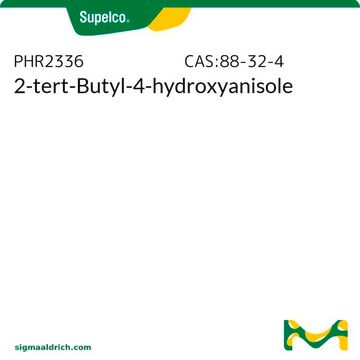1083008
USP
2-tert-Butyl-4-hydroxyanisole
United States Pharmacopeia (USP) Reference Standard
Sinónimos:
2-BHA, 3-(1,1-Dimethylethyl)-4-methoxyphenol, 3-tert-Butyl-4-methoxyphenol
About This Item
Productos recomendados
grade
pharmaceutical primary standard
API family
butylhydroxyanisole
manufacturer/tradename
USP
application(s)
pharmaceutical (small molecule)
format
neat
storage temp.
2-8°C
InChI
1S/C11H16O2/c1-11(2,3)9-7-8(12)5-6-10(9)13-4/h5-7,12H,1-4H3
InChI key
IMOYOUMVYICGCA-UHFFFAOYSA-N
¿Está buscando productos similares? Visita Guía de comparación de productos
General description
Application
Analysis Note
Other Notes
Related product
hcodes
pcodes
Hazard Classifications
Aquatic Chronic 2
Storage Class
11 - Combustible Solids
wgk_germany
WGK 3
flash_point_f
Not applicable
flash_point_c
Not applicable
Certificados de análisis (COA)
Busque Certificados de análisis (COA) introduciendo el número de lote del producto. Los números de lote se encuentran en la etiqueta del producto después de las palabras «Lot» o «Batch»
¿Ya tiene este producto?
Encuentre la documentación para los productos que ha comprado recientemente en la Biblioteca de documentos.
Los clientes también vieron
Nuestro equipo de científicos tiene experiencia en todas las áreas de investigación: Ciencias de la vida, Ciencia de los materiales, Síntesis química, Cromatografía, Analítica y muchas otras.
Póngase en contacto con el Servicio técnico



